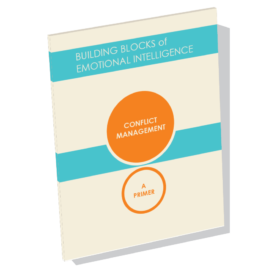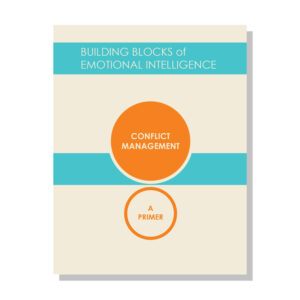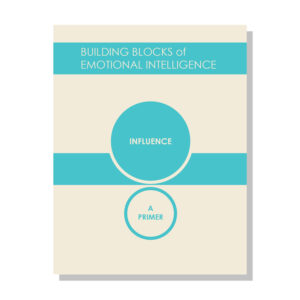

Coaching for Conflict with Self-Awareness and Self-Management
November 20, 2017 Time to read: 4 min.The more I have learned about the emotionally intelligent leadership competencies, the more I am struck by how little most other conflict management trainings and literature focus on self-awareness and self-management. Some models focus on social awareness, incorporating listening for other perspectives, but most focus almost exclusively on relationship management “moves” – i.e. how we interact productively with others in conflict.
In my experience, any approach not grounded in the self is not likely to succeed. The best conflict “moves” in the world won’t help me engage effectively in our conflict if I arrive feeling that I’m right, you intentionally hurt me, and that what I really want is “justice.”
Before we focus on strategies to manage conflict, we must raise critical self-awareness and build self-management so that we are able to bring our best selves to any relationships in our lives – personal or professional. In my coaching of people in conflict, this rigorous self work begins with exploring the baggage and stories that might be getting in our own way. Then it moves to self-management, exploring how we can manage our baggage and stories so that we can effectively communicate with others in conflict.
What baggage might be getting in your way?
As a leadership coach, my first goal is to help people see how their emotional reactions to conflict have triggered their “baggage’’, or the thoughts, beliefs, emotions and behaviors that limit their ability to effectively engage others. This happens through asking a series of questions that include some combination of the following:
- Tell me exactly when in this conflict you were first aware of having a strong negative emotion?
- Tell me what emotions you were feeling? (follow up with probing questions and only accept answers that are actually emotions)
- Exactly what happened that triggered these emotions?
- When you were feeling these emotions, what thoughts were going through your head?
- And so what did you do?
- How do you think your actions served you, and how do you think they might have gotten in the way of resolving your conflict?
- If you had to name what you really wanted to happen—your real goal—what would you say?
What stories might be getting in your way?
Once people are able to see their baggage more clearly, they are ready to consider how their stories—about other people involved and about what actually happened—may also need to be reconsidered. My next goal, then, is to help them become aware of their negative stories, focusing mostly on the person or people on the other side of the conflict. This work happens through the following questions:
- When you were/are feeling the strong emotions you have named, what story are you telling yourself about the person/people on the other side of the conflict?
- What evidence do you have that supports your story?
- How does your story about this person or people serve you, and how does it get in your way of engaging effectively in this conflict?
- What other stories might be true about this person/people and their emotions, values and behaviors?
How can you manage your baggage and stories?
Getting to awareness about our baggage and stories tends to be pretty enlightening for most people in conflict because we are least likely to be aware when we are feeling wronged by others. Awareness alone, however, does not mean we are prepared to effectively engage with others in a conflict. We also need to deliberately manage our baggage and stories in the moment.
To manage the baggage, I focus people on self-management strategies they can use at the moment they feel emotionally triggered. Coaching for emotional self-management follows this line of questioning:
- How can you manage the emotional triggers that are getting in your way right now?
- What do you need to do for your true goal to be working through this conflict, and what can you do in the moment to hold onto this goal?
Helping people manage their stories is usually the highest impact self-management coaching for people in conflict. We explore what they need to believe about the other person/group in the conflict to effectively engage them. I help them build the emotional “muscle” of replacing negative stories with “noble” ones by engaging them in the following exercise:
- Make a list of the real challenges this person is facing, and the emotions that feel related to this conflict. What can you genuinely empathize with?
- Write a list of at least five aspects of the other’s noble story that you respect or value. These may include: values they hold; positive shared experiences; behaviors and actions that positively reflect on their character; their real strengths and past successes; the noble intentions that drive their actions
Without fail, after making this list people notice an immediate positive shift in their emotions connected to the other person/people with whom they are in conflict. I charge them with reading their list before their next engagement and noticing how it impacts how they show up differently to the interaction. People usually report that they are suddenly able to engage without the negative emotions they have been bringing up to this point, and they are able to listen with real curiosity to other people’s experiences and interpretations of the conflict. This, in turn, prevents escalation, and may even prevent future conflicts from coming up.
Conclusion
When we add rigorous self work to our conflict management coaching, we make it exponentially more likely that our people will effectively access the relationship management strategies they learn in most programs and literature in the field. When we help people become aware of their emotions and the baggage and stories they trigger, they realize the extent to which they are working from assumptions without evidence. They become motivated to manage their baggage and revise their stories about others involved in their conflict.
When you self manage effectively, two things happen. First, you show up able to listen with curiosity to other perspectives. Second, you show up reflecting other people’s noble stories back to them. When we reflect people’s noble stories—their best selves—to them, that’s typically how they will show up. If our goal is truly to resolve conflict, then shouldn’t we be inviting our best selves to the conversation?
In Conflict Management: A Primer, Daniel Goleman, Richard Boyatzis, and colleagues introduce Emotional Intelligence and explore the many facets of approaching conflict management with skill and positivity.
In a relatively short read, the authors illustrate how to frame conflict as an opportunity rather than a burden, how to maintain bonds despite differing perspectives, and how to blend mindfulness and thoughtful analysis into professional relationships that work.
For more in-depth understanding of emotional and social intelligence in leadership, see the full primer collection or the Crucial Competence video series.








